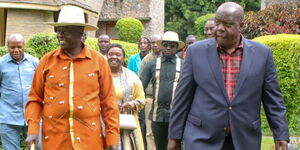The United States is intensifying its efforts to overhaul the Kenya-led multinational force in Haiti, proposing a shift to a United Nations peacekeeping mission amidst spiralling gang violence that has crippled the capital, Port-au-Prince.
The move follows a week of escalating chaos, with gangs taking over 85 per cent of the city and forcing the shutdown of Haiti’s main airport through targeted shootings.
A draft resolution by the US aimed at expediting this transformation is now under scrutiny by the U.N. Security Council. The resolution urges Secretary-General António Guterres to accelerate contingency planning for the transition, a process that could take months. However, opposition from Russia and China has stalled immediate approval, citing the need for more detailed deliberations.
The deteriorating situation in Haiti has thrust the Kenya-led mission into the spotlight. Initially envisioned as a 2,500-strong force, it has struggled with limited resources and personnel. Currently, only about 430 officers, mostly from Kenya, alongside contributions from the Bahamas, Belize, and Jamaica, are operational. Kenya’s President William Ruto has committed an additional 600 officers, slated for deployment this month.
Already, gang control has surged since the assassination of President Jovenel Moïse in 2021, with rampant killings, rapes, and kidnappings sparking violent resistance from vigilante groups. The instability has paralysed the transitional council tasked with restoring democratic order, as political infighting led to the dismissal of the interim prime minister last week.
Haiti’s government has called for a UN peacekeeping force, a request supported by the Organization of American States. However, the proposal has drawn mixed reactions among Haitians. While some view foreign intervention as a necessary measure, others remain sceptical, citing the troubled legacy of past missions.
The last UN peacekeeping mission in Haiti, active from 2004 to 2017, faced allegations of sexual assault and was linked to a cholera outbreak that claimed nearly 10,000 lives. Memories of these incidents have left many Haitians wary of another international force, even as the situation becomes increasingly dire.
U.S. diplomats are pressing for rapid action, highlighting the need for consistent funding and a unified international approach. The Thursday deadline for objections to the draft resolution passed without consensus, leaving the proposal’s fate hanging.
The gang-driven violence has also exacerbated Haiti’s humanitarian crisis, with thousands fleeing their homes. Many now seek refuge in overcrowded shelters, further straining the country’s fragile resources.
The proposed transformation into a UN peacekeeping force could address some of these challenges by providing steady funding and broader international support. However, the transition could also delay immediate action, a prospect that raises concerns given the urgency of Haiti’s security situation.
With the UN Security Council set to discuss Haiti’s plight this week, all eyes are on the global powers to forge a solution that balances immediate action with long-term stability.












